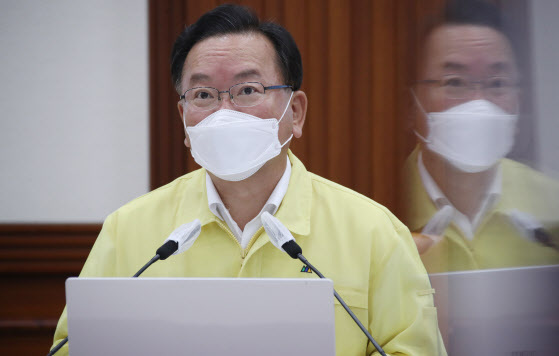The government will toughen quarantine inspections in the Seoul metropolitan area for two weeks starting Thursday, when relaxed social distancing rules begin to take effect, officials said Tuesday.
The confirmed cases in the Seoul metropolitan area made up 73.9 percent of the nationwide total in the fourth week of June, up from 63.5 percent in the fourth week of May. The daily number of new cases in Greater Seoul averages 363.4.
“More than 70 percent of domestic infections are concentrated in the (Seoul) metropolitan area. If the metropolitan area, where more than half of the total population lives, is not stable, we will never win the fight against COVID-19,” Prime Minister Kim Boo-kyum said Tuesday in a meeting with the respective mayors of Seoul and Incheon and the Gyeonggi Province governor.
During the two weeks, the government plans to intensively carry out quarantine inspections on designated facilities in Greater Seoul, including entertainment facilities, religious facilities and academies, which are at high risk of infection.
A one-strike-and-you’re-out policy will apply to violations of the quarantine rules, in line with the principle of zero tolerance, authorities said. Regions where many violations occur will face new restrictions on business operating hours and prohibitions on gatherings.
An individual violator can face a fine of up to 100,000 won ($88.50). If an individual is confirmed positive for the coronavirus after violating an administrative order, the government can claim the right to indemnity for expenses such as treatment.
In Seoul, the government plans to intensively inspect 168,166 entertainment facilities, restaurants and cafes during the period to verify compliance with operating time limits and prohibitions on private gatherings of seven or more people. It also plans to check 7,300 karaoke establishments and internet cafes.
Strict measures such as fines and prohibitions on gatherings will be imposed on businesses that violate quarantine rules.
The Seoul Metropolitan Government will increase the operating hours of screening centers to quickly detect infected people. Weekday screening clinics will operate until 9 p.m. instead of the current 6 p.m. On weekends, they will stay open until 6 p.m. instead of the current 4 p.m.
Concerns have been persistent as the number of new infections diagnosed each day is not diminishing, and because new variant cases continue to occur just as the social distancing rules are set to be relaxed.
As of Monday at midnight, the number of confirmed cases had risen by 595 to 156,167. The number of new cases increased by 94 from the previous day, marking the second consecutive day of a mark over 500.
Also, 267 people in Korea have been confirmed positive for the four major variants over the past week -- alpha, beta, gamma and delta.
The total number of people infected with variants here is 2,492. The largest proportion of the new cases, 189 of 267, involve the alpha variant first identified in the US. Another 23 of the newly diagnosed people had the delta variant first detected in India. Four had gamma, first detected in Brazil, and one person had the beta variant, first identified in South Africa.
The government designated four more countries -- India, Indonesia, Pakistan and the Philippines -- whose nationals will be ineligible for quarantine exemptions as of July 1. The list now comprises 21 countries, including South Africa, Bangladesh, Brazil and Chile. People from those countries must be isolated for two weeks even if they have been vaccinated.
The government plans to continue to review the possibility of adding other countries, including the UK, after analyzing risks, vaccine efficacy and infection rates.
As of Monday at midnight, an additional 12,703 initial vaccinations had been administered since the previous day, as the total number of vaccinated people reached 15,304,120. The inoculation rate was 29.8 percent of the population.
The number of second doses administered since the previous day was 112,722, with the cumulative number of fully vaccinated people marking 4,758,395. The figure represents 9.3 percent of the population.
By Shin Ji-hye (
shinjh@heraldcorp.com)







![[Today’s K-pop] Blackpink’s Jennie, Lisa invited to Coachella as solo acts](http://res.heraldm.com/phpwas/restmb_idxmake.php?idx=644&simg=/content/image/2024/11/21/20241121050099_0.jpg)
